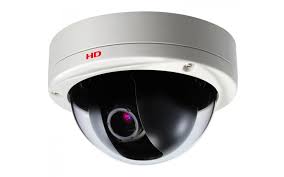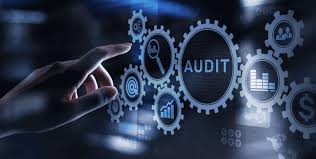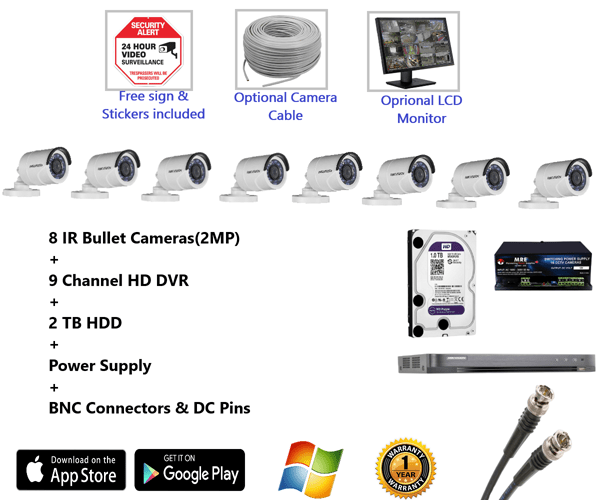When it comes to ensuring comprehensive security and surveillance, CCTV cameras with audio recording capabilities play a crucial role in capturing not only visual but also auditory evidence of incidents. These advanced cameras are equipped with built-in microphones that allow them to record sound along with video footage, providing a more complete picture of the events taking place.
The inclusion of audio recording in CCTV cameras offers several benefits for both residential and commercial settings. In businesses, audio recording can help in monitoring employee interactions, customer service quality, and overall workplace safety. It can also serve as valuable evidence in case of disputes or incidents requiring investigation.
For homeowners, CCTV cameras with audio recording provide an added layer of security by capturing not just visuals but also sounds around the property. This can be particularly useful in identifying potential threats, such as intruders or suspicious activities, even before they are visible on camera.
However, it is important to note that the use of audio recording in CCTV cameras must comply with legal regulations regarding privacy and data protection. It is essential to inform individuals if audio is being recorded on the premises to ensure transparency and compliance with laws governing surveillance practices.
In conclusion, CCTV cameras with audio recording capabilities offer enhanced security and surveillance features that can significantly improve the effectiveness of monitoring systems. By capturing both visuals and sound, these cameras provide a more comprehensive overview of events, making them a valuable asset for protecting properties and ensuring safety in various environments.
8 Advantages of CCTV Cameras with Audio: Amplifying Security and Insight
- Enhanced security with both video and audio evidence of incidents.
- Improved monitoring of employee interactions and customer service in businesses.
- Provides valuable evidence for investigations and dispute resolution.
- Adds an additional layer of security for homes by capturing sounds around the property.
- Early detection of potential threats through audio surveillance.
- Helps in identifying suspicious activities based on audio cues.
- Offers a more comprehensive overview of events with combined video and audio recordings.
- Can act as a deterrent against criminal activities due to the presence of audio recording.
Seven Drawbacks of CCTV Cameras with Audio Recording: Privacy, Legalities, and Technical Challenges
- Privacy concerns due to audio recording in sensitive areas
- Legal issues regarding audio recording without proper consent
- Potential misuse of audio recordings for unauthorized purposes
- Increased storage requirements for storing audio data along with video footage
- Interference from background noise affecting the clarity of audio recordings
- Higher cost associated with CCTV cameras equipped with audio recording functionality
- Complexity in setting up and configuring audio recording features, requiring additional technical expertise
Enhanced security with both video and audio evidence of incidents.
The integration of audio recording in CCTV cameras enhances security by providing both video and audio evidence of incidents. This dual capability offers a more comprehensive view of events, allowing for a deeper understanding of the context surrounding any security breach or suspicious activity. By capturing not only visuals but also sound, CCTV cameras with audio recording ensure that crucial details such as conversations, noises, or alarms are preserved, making it easier to assess the situation accurately and respond effectively. This combination of video and audio evidence strengthens security measures and improves the overall surveillance system’s ability to monitor and protect properties effectively.
Improved monitoring of employee interactions and customer service in businesses.
The integration of audio recording in CCTV cameras offers businesses a valuable tool for enhancing monitoring of employee interactions and customer service. By capturing not only visual but also auditory information, these cameras provide a more comprehensive insight into the dynamics within the workplace. This feature allows employers to assess the quality of customer interactions, identify training needs, and ensure that employees adhere to company policies and standards. Additionally, audio recording can serve as a valuable resource for resolving disputes, improving service delivery, and maintaining a safe and productive work environment.
Provides valuable evidence for investigations and dispute resolution.
CCTV cameras with audio recording capabilities play a crucial role in providing valuable evidence for investigations and dispute resolution. The inclusion of audio recording along with video footage offers a more comprehensive account of events, enabling authorities and stakeholders to better understand the context and details surrounding incidents. This audio-visual evidence can be instrumental in resolving disputes, clarifying misunderstandings, and holding accountable those involved in unlawful activities. Overall, the ability of CCTV cameras with audio recording to capture both visuals and sound enhances the credibility and effectiveness of surveillance systems in various settings.
Adds an additional layer of security for homes by capturing sounds around the property.
The inclusion of audio recording in CCTV cameras adds an additional layer of security for homes by capturing sounds around the property. This feature allows homeowners to not only see but also hear what is happening in and around their premises, providing a more comprehensive monitoring system. By capturing sounds, CCTV cameras with audio recording can help identify potential threats or suspicious activities early on, enhancing overall security measures and peace of mind for residents.
Early detection of potential threats through audio surveillance.
The integration of audio recording in CCTV cameras enables the early detection of potential threats through audio surveillance. By capturing sounds in addition to visuals, these cameras can pick up on suspicious activities or conversations that may indicate a security risk. This proactive approach allows for quick intervention and response to prevent incidents before they escalate, enhancing overall security measures and ensuring a safer environment for both residential and commercial spaces.
Helps in identifying suspicious activities based on audio cues.
CCTV cameras with audio recording capabilities play a vital role in helping to identify suspicious activities based on audio cues. By capturing not only visuals but also sound, these cameras can detect unusual noises, conversations, or disturbances that may indicate potential threats or unauthorized activities. This feature enables security personnel or homeowners to respond promptly to suspicious sounds and take necessary actions to prevent security breaches or criminal incidents. The ability to analyze audio cues adds an extra layer of surveillance that enhances the overall effectiveness of CCTV systems in detecting and addressing security concerns proactively.
Offers a more comprehensive overview of events with combined video and audio recordings.
By offering a more comprehensive overview of events with combined video and audio recordings, CCTV cameras with audio recording capabilities provide a valuable advantage in surveillance and security systems. The integration of sound with visual footage allows for a more detailed understanding of incidents, enabling users to capture not only what is happening but also what is being said. This additional layer of information enhances the overall effectiveness of CCTV systems by providing a more complete picture of events, making it easier to analyze and respond to situations accurately.
Can act as a deterrent against criminal activities due to the presence of audio recording.
The inclusion of audio recording in CCTV cameras serves as a powerful deterrent against criminal activities due to the added layer of surveillance it provides. The knowledge that not only video but also sound is being captured can discourage potential offenders from engaging in unlawful behavior, knowing that their actions are being recorded in detail. This proactive measure can help prevent crimes before they occur, making properties and premises equipped with CCTV cameras with audio recording less attractive targets for criminals.
Privacy concerns due to audio recording in sensitive areas
One significant con of CCTV cameras with audio recording is the heightened privacy concerns, especially when deployed in sensitive areas. The ability of these cameras to capture not only visual but also auditory information raises potential privacy issues as conversations and other sounds may be recorded without individuals’ consent. This intrusion into private conversations or confidential information can lead to discomfort, distrust, and legal implications if not managed appropriately. It is crucial for organizations and individuals to carefully consider the ethical implications of audio recording in CCTV systems and implement clear policies to address privacy concerns in sensitive areas.
Legal issues regarding audio recording without proper consent
One significant con of CCTV cameras with audio recording capabilities is the potential legal issues that may arise from recording audio without proper consent. In many jurisdictions, laws regulate the use of audio surveillance and require explicit consent from individuals being recorded. Failure to comply with these regulations can result in legal consequences, such as privacy violations and lawsuits. The lack of awareness or understanding of these laws can lead to inadvertent breaches of privacy and undermine the credibility of the surveillance system. Therefore, it is crucial for users of CCTV cameras with audio recording to be well-informed about the legal implications and ensure that proper consent is obtained before recording audio in any setting.
Potential misuse of audio recordings for unauthorized purposes
One significant con of CCTV cameras with audio recording is the potential misuse of audio recordings for unauthorized purposes. While audio recording can provide valuable information for security and surveillance, there is a risk that the recorded conversations or sounds may be exploited or misused in ways that infringe on individuals’ privacy rights. Unauthorized access to sensitive audio recordings could lead to breaches of confidentiality, manipulation of information, or even blackmail. Therefore, it is crucial to implement strict security measures and protocols to prevent the misuse of audio recordings from CCTV cameras and ensure that privacy rights are respected at all times.
Increased storage requirements for storing audio data along with video footage
One of the drawbacks of CCTV cameras with audio recording is the increased storage requirements needed to store audio data along with video footage. Audio recordings can significantly add to the amount of data that needs to be stored, leading to higher costs for storage solutions and potentially requiring more frequent data management and backups. This increased demand for storage space can pose challenges for businesses and homeowners looking to maintain long-term surveillance records efficiently while managing storage costs effectively.
Interference from background noise affecting the clarity of audio recordings
One significant drawback of CCTV cameras with audio recording is the potential interference from background noise, which can adversely affect the clarity and quality of audio recordings. In environments where there is constant noise or ambient sounds, such as traffic, machinery, or conversations in nearby areas, the audio captured by the camera may become muddled or distorted. This interference can make it challenging to discern important details or conversations, reducing the overall effectiveness of the audio recording feature and potentially compromising the accuracy of surveillance data.
Higher cost associated with CCTV cameras equipped with audio recording functionality
One of the drawbacks of CCTV cameras with audio recording functionality is the higher cost associated with these advanced systems. The inclusion of audio recording capabilities adds to the overall price of the surveillance setup, making it a more significant investment compared to traditional CCTV cameras without audio features. This increased cost may pose a challenge for individuals or businesses operating on a limited budget, as they may need to allocate additional funds to afford the enhanced security benefits provided by audio recording technology. Therefore, while the added functionality of audio recording can be beneficial, the higher upfront costs involved in acquiring and installing these systems may deter some users from implementing them in their security infrastructure.
Complexity in setting up and configuring audio recording features, requiring additional technical expertise
Setting up and configuring audio recording features on CCTV cameras can pose a significant challenge due to the complexity involved, often necessitating additional technical expertise. Unlike video recording, audio setup requires careful calibration and testing to ensure optimal sound quality and synchronization with video footage. This process may involve adjusting microphone sensitivity, noise cancellation settings, and audio compression formats, which can be daunting for users without a technical background. Moreover, troubleshooting audio issues such as feedback, distortion, or low volume levels may require specialized knowledge and skills, making the setup of audio recording a more intricate task compared to video-only surveillance systems.




